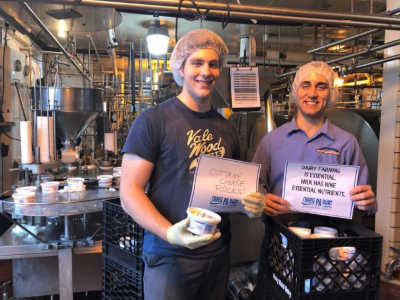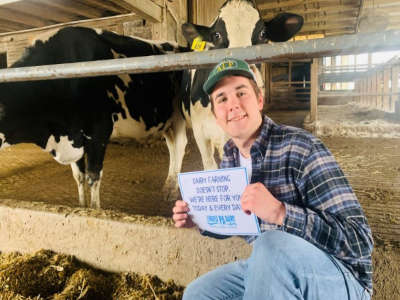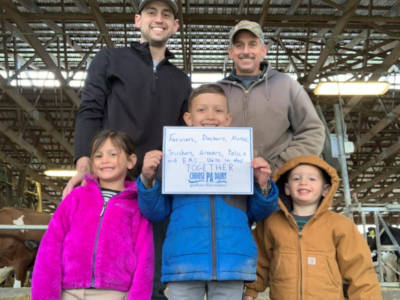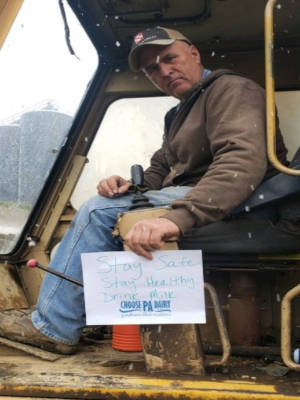By Jayne Sebright
If you would look back on headlines about dairy from a year ago, you would read that 2020 was expected to be an average or maybe even better than average year, with milk prices and milk production expected to be stable and fairly strong. Expectations were that 2020 would be a recovery year. Wet crops in some parts of the nation were expected to hold back prospects for tremendous increases in milk production, but overall dairy demand was expected to be bolstered by a strong economy. No analysts could predict what 2020 held in store for the dairy industry and for our society in general.
Winston Churchill once said, “Never let a good crisis go to waste.” While most of us are ready for this year to be behind us, hopefully you can still come up with at least one thing you learned from 2020 that will strengthen some aspect of your life. Here are a few lessons from 2020 for those of us who work in dairy.
Black swan events do happen.

Volatile milk prices are nothing new for dairy farmers, but this year’s price cycle had more dramatic swings than what we have ever experienced. Market analysts would often reference the “Black Swan” event that could potentially swoop in and have a dramatic impact on the marketplace. But there have only been a few instances in history when we saw that happen, and hardly any have had as lasting and unpredictable repercussions as the pandemic has had.
If you just look at the Class III milk price alone, you can see the havoc that COVID-19 created in the marketplace. From January to April, the Class III milk price fell from $17.05 to $13.07 per hundredweight. By June, it had jumped back up to $21.04, but then fell back down again to $16.43 per hundredweight in September. November’s Class III milk price is expected to be one of the highest in recent history, but then Class III price futures trail off significantly, with the next six months averaging only about $16.20 per hundredweight.
This year demonstrates the need for all dairy farm families to think through their risk management strategy. Whether you have cash reserves to carry you through unexpected dips in the market or you utilize one of the risk management options available, it is more essential than ever to make sure you can protect your business in a volatile marketplace. Knowing your production cost and then evaluating programs like the USDA’s Dairy Revenue Protection Program to lock in a minimum price to protect your profits can help you manage through “Black Swan” events like we experienced in 2020.

It’s good to have a contingency plan.
“Risk management” also took an entirely new dimension in 2020, with both farm and non-farm businesses having to think through their exposure to risks they had never thought much about before. For instance, some farms had entire plans written around what would happen if an employee contracted COVID-19 and had to be quarantined for 14 days. Others had to think through replacing supplies, such as nitrile gloves, when the entire nation was facing shortages in resources. Evaluating those potential “risks” that could affect the farm’s ability to operate before you are in a crisis is always beneficial to keep the farm moving forward.
The more complex a system is, the harder it is to turn on a dime.
Last spring, there was a lot of frustration about milk being dumped on the farm while, at the same time, dairy cases in the grocery stores were bare. One of the challenges the industry faced was the immediate shut-downs that occurred all over the nation. Within a week, retail sales of dairy went up 38 percent while food service sales fell as much as 90 percent, in some cases, as restaurants and institutions closed their doors. Milk tankers were already in route to fill the previous week’s orders when trucks were pushed back without a home. At the same time, grocery store chains struggled to know how much milk to order and where it was needed most. To me, it is like a freight train heading down the tracks at full speed, when the engineer is suddenly told to jump to the adjacent track. It is very difficult, if not impossible, to do.
That is why small artisanal businesses did so well throughout the pandemic. It is like contrasting a compact car to an 18-wheeler truck. It is much easier to pivot in the one than the other. Small local businesses were able to transition to home delivery and mail-order sales of dairy products. With consumers concerned about contracting the virus, these businesses were able to step up and meet their need by offering essentially “dairy at their doorstep.”

Farmers are essential.
One of the “silver-linings” in this past year has been the renewed recognition within our society of how vulnerable our food supply is. For the first time in our generation, people were forced to realize that their food didn’t just magically appear in the grocery store.
The pandemic gave us the opportunity as an industry to share our story and help people understand the essential role that dairy farm families and all those in agriculture play in providing a safe, affordable food supply for our neighbors and the world.

Click here to see more...